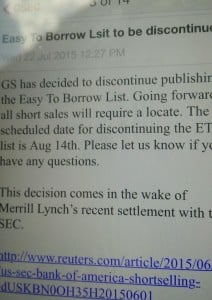This post may be a little inside-baseball. I will not explain at length the significance of this (if it does not make sense, you will have to read around in DeepCapture to understand it fully), but the short version is as follows.
My battle with Wall Street started off as a fight regarding slop in the settlement system and how it could be used to rig the stock market (the battle later expanded into other areas, including organized crime, economic warfare, and what I felt was an insufficiently proactive regulatory environment, the latter of which, I am happy to say, is showing signs of real improvement). For a decade I have asserted that one of the sources of that slop has been the system that governs short selling. One of the sources of that slop has concerned how hedge funds locate stock to short sell. And one form of that slop originates in the “Easy to Borrow List” that prime brokerages put out each day.
Every day each prime broker (e.g., Goldman, JP Morgan) looks at the stock it has available to lend to short sellers. Assume that a prime broker has 100,000 shares of Martha Stewart Omnimedia (ticker: MSO) “in the box,” which is to say, “available to lend.” They put that on a list of “Easy to Borrow” stocks that it then faxes in the morning to its hedge fund clients. A hedge fund who wants to short MSO then looks at this morning’s fax, and can short sell sell 100,000 shares of MSO. It can claim it has met its requirements to have a good faith belief that it will be able to locate stock to deliver in three days based on its having seen this morning’s Easy to Borrow list from its prime broker.
Of course, three high school kids and a pet turtle can figure out the flaw in this system: there is nothing to keep five different hedge funds who all receive the same fax from all short selling that same 100,000 shares MSO, and thus, selling 500,000 shares into the market place (while only 100,000 are able to be delivered). Yet the authorities have traditionally done nothing to stop this, because the prime broker can say, “We didn’t lie, there were 100,000 MSO in the box this morning when we faxed out that list.” And the five individual hedge funds could not be pursued because each one could say, “I saw it on the Easy to Borrow list this morning, so I had a ‘good faith reason to believe’ I had located shares available to borrow.” Believe it or not, while the nefarious activities described within DeepCapture often use a lot of jargon, and likely seem highly arcane to outsiders, at their heart they are often no more complicated than that. Therein lies the brilliance of these illegal schemes: there is not one pair of dirty hands to cuff, just a bunch of smudgy fingers scattered throughout the system.
Seven weeks ago the SEC (towards which I, having been quite a scold for many years, now feel compelled to give significant credit) tagged Merrill Lynch/Bank of America with an $11 million fine regarding their participation in such loosey-goosey activities over many years. See Merrill Lynch pays $11 mln to settle short sale violations (Reuters, June 1, 2015). In full disclosure, I should mention that Merrill Lynch/Bank of America are on the business end of a lawsuit concerning precisely these activities, a lawsuit which I filed years ago in California, which a few months ago received a green light from the California Supreme Court, which just this week had a judge assigned to try the case (who herself has called a Case Management Conference for August 12), and which, with a little bit of luck, will be being heard later this year or early in 2016 by twelve California citizens good and true.
In a major development, yesterday afternoon Goldman circulated an internal memo announcing that it is discontinuing its long-standing use of Easy to Borrow lists. (To protect my source within Goldman I am sanitizing things by just posting a screen shot of the relevant portion):









This is very amazing post i will link this information to my blog, keep posting!
that’s totally nuts, GS always pretending not be gaming with the heritage of all their investors but it’s been a while now that no one can trust in their actions or annual reports.